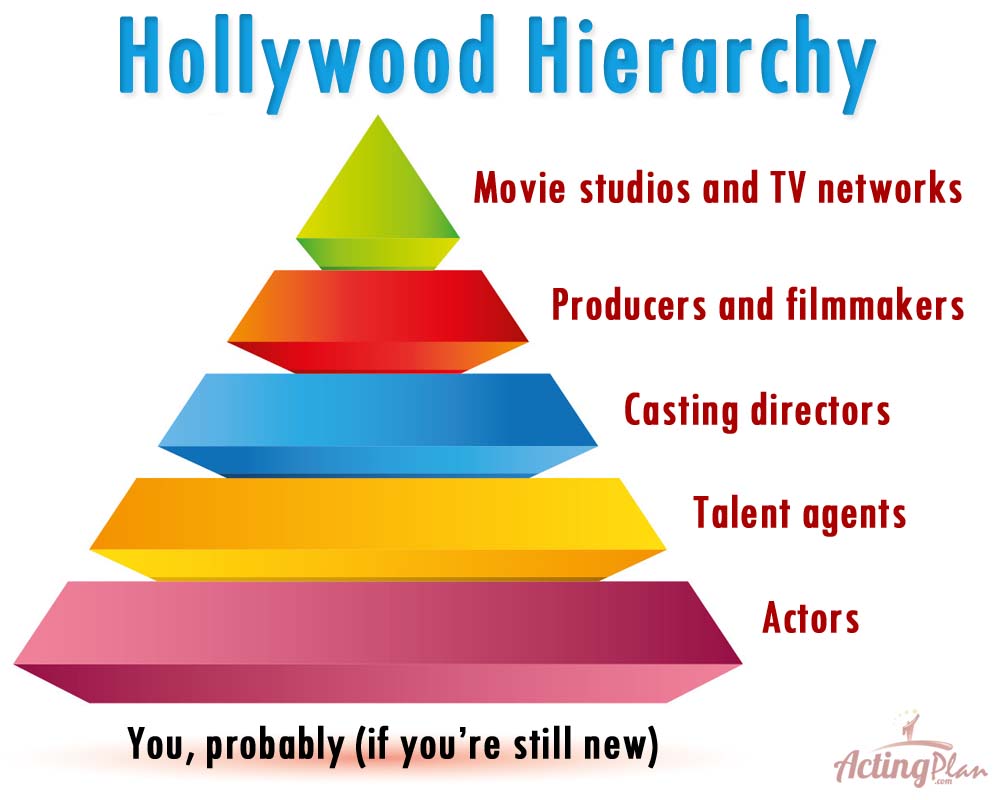 When inexperienced actors move to Los Angeles, their first worry is usually about how to get an acting agent to sign them.
When inexperienced actors move to Los Angeles, their first worry is usually about how to get an acting agent to sign them.
In this article, I’m providing you with all the tools you need to accomplish that. But first, let’s stop for a second and take a breath.
Whether you’re a recent transplant to Los Angeles who just started acting, or you’ve been at this for a while, I suggest you to thoroughly review the all-important “preparation phase.”
Every actor who wants to know how to get an acting agent forgets to consider one simple aspect. Why would an agent want to sign you?
The only reason you’ll get signed is if you can make the agent money, eventually. Period.
So what do agents want to see in actors who they would potentially sign? Three things:
- Professionalism
- Preparedness
- Eagerness to work
It doesn’t matter if you have little experience, or do not fit the “20 year old hottie” look. There’s a project for any type of actor out there. As long as you’re ready to work, your agent will be able to send you out to auditions, and hopefully make money off of you.
How do you convince an agent that you are that type of hardworking actor?
This is exactly what I’m going to cover in this very in-depth guide on how to get an acting agent. I’ve provided you with all the information, every detail and tool-tips you need to know in order to successfully accomplish this task in a short but realistic amount of time.
Let’s start at the beginning to understand what agents do and how the industry works.
Need a list of agents? 150 Top Talent Agencies in Los Angeles (2017)
Who are Talent Agents?
To learn how to get an acting agent, you need to first understand how they work.
In Los Angeles, you do not refer to them as “acting agents.” It’s simply “an agent.”
As it has been said many times before, acting is a business. Hollywood’s structure is no different. It has three components: buyer, seller, and product/service (that’s you).
Talent agents are the salesmen in Hollywood. This doesn’t sound as lucrative as “agent,” but this applies to their job description to a letter. I’ll show you.
To better explain Hollywood’s movie business hierarchy, I made this graphic for you:

As a newbie actor, you’re at the very bottom of the pyramid. You’re just getting started.
In the graphic you see that talent agents are often the middleman between casting directors (who work for film and TV productions) and the talent (you, the actor).
When a film goes into production, they need to cast actors. For that, they hire a casting director (CD). CDs then work with talent agents who pitch them actors off their roster.
Basically, your acting services are being sold to the production by your agent.
This is an agent’s job described in its most fundamental sense. In reality, it’s much more difficult. To be a good talent agent you need a set of special skills, charisma and patience. All of this is required to deal with casting directors and actors, and come to agreements.
What a talent agent is NOT:
- Agents are not managers, they won’t manage your whole career;
- Agents are not publicists, they won’t do any PR work for you;
- Agents are not lawyers, they will not give you any legal advice;
- Agents are not your parents, so keep your personal issues at home.
What agents are responsible for are (a) finding you work and (b) negotiating contracts.
Bottom Line: Talent agents are the sales force in Hollywood. They work as middlemen between actors and casting directors.
How to know if an agent is “good”?
 The better and more connected your agent is, the bigger chances you have to be pitched for large film and TV productions in Hollywood.
The better and more connected your agent is, the bigger chances you have to be pitched for large film and TV productions in Hollywood.
An agent is usually defined by his client list, both in terms of volume (#2) and quality (#1).
Most powerful acting agents who make huge deals happen have made their way to work at top talent agencies in Los Angeles, and often have celebrities as their clients.
Does that mean one of those top talent agency guys would be the best fit for you? It certainly can be, but not necessarily. There’s more than one thing to consider.
A “good agent” is a relative term; it depends where in your career you currently stand.
For example, a talent agent from a boutique agency (small talent agency) may not have James Cameron on speed dial, but he may work ten times harder to get you out for auditions because it’s in his best interest to make a name for himself through you.
At the same time, an agent from a top talent agency that already has A-list celebrities to take care of will not have as much time to dedicate to your career.
Generally, it’s best to pick a promising agent that fits your current acting career status.
Bottom Line: The best agent for you isn’t necessarily the one from the top talent agency, but rather the one that will work the hardest for your career.
How much do agents get paid?
All of your paychecks go through your agent. He receives a check from the production, takes his cut out of that, and then sends the rest to you. That’s common practice.
There is a standard fee that all acting agents receive off of your paycheck: 10 percent.
However, this can only be enforced onto SAG-AFTRA franchised agencies (more on this below). If they’re not franchised, technically, they can set any percentage they want.
That said, agent’s 10 percent cut is the unwritten rule in the US showbiz market. Therefore, if you ever encounter a non-franchised agent (not a manager!) who charges you more than 10%, it’s your cue to stop doing business with that agent or agency.
Note: No legitimate acting agent should ever charge you upfront fees, or ask for any other payments. An agent’s only source of income is the 10% commission. Period.
Furthermore, an agent cannot ask you to attend any workshops, seminars or require you to go to specific photographers or acting teachers. If they do, that’s an indication that an agent receives a cut from the referral – a red flag for you (more on agent scams below).
Now, if you’re uncomfortable with your agent receiving the check, you can change that.
Here’s what you need to know about this:
“By the way, I probably shouldn’t tell you this but you have the legal right to bump your agent’s check authorization. All you have to do is tell the production company you want the money to go directly to you. And the time to do this is when you’re filming, not after you wrap. This is a great way to get paid faster. It’s also a great way to piss off your agent.” – Secret Agent Man, Backstage.com
Just remember that trying to change typical things in Hollywood is a good way to end professional relationships and get yourself a bad reputation in town.
Why do agents get 10% of your money? Because they do a lot of work for you.
Besides the fact that an agent gets you the audition, you also don’t want to deal with all that bureaucracy or chase after payments. 10% cut is totally worth it.
Keep in mind that your agent will also receive 10% even from jobs you get yourself.
Bottom Line: Acting agents get paid 10% off your paycheck. That’s their only source of income and they do not charge for anything else.
How to know if an agent is “legit”?
 There are a lot of cheaters in Hollywood. Most of those target actors and particularly newbies who don’t know any better. Fake talent agents is just one of those common scams you find all over LA.
There are a lot of cheaters in Hollywood. Most of those target actors and particularly newbies who don’t know any better. Fake talent agents is just one of those common scams you find all over LA.
Fortunately, as long as you’re willing to do some research and learning, you can spot most frauds.
One of the best indications that an agency is legitimate is if they are SAG-AFTRA franchised.
This means that the talent agency works under and abides by the rules of SAG-AFTRA union which protects the interests of all member actors.
To get franchised by SAG-AFTRA, a talent agency will have to prove the union that they are a legitimate business.
Franchised talent agencies can represent both union and nonunion actors.
To check if your talent agency is SAG-AFTRA franchised, search for it here.
Not all legitimate talent agencies in Los Angeles will be SAG-AFTRA franchised.
If an agency is not franchised, then you’ll need to do your own due diligence to see if they’re legit or not. Ask around, use Google and your common sense.
FTC’s Consumer Information has some advice here for spotting talent agency scams.
Bottom Line: Legitimate agents do not charge more than 10% and do not force actors into workshops, classes or to use any specific services.
Do you even need an agent?
Absolutely. Once you get signed by a good talent agency with solid connections, you move onto the bigger leagues of this business. More doors will open up for you.
However, that doesn’t mean that you can sit back and avoid looking for work.
Getting an acting agent is like receiving a special power in a video game. You still have to play the game, but now you have more tools at your disposal that helps you beat it.
Your agent will get you inside the Hollywood’s business. Your status as an actor goes up.
Not only will your agent get you more work, but they can become your guide and guardian within LA’s show business, but only in certain areas.
Bottom Line: If you want to work on big productions in Los Angeles, you do need an agent who will open many more doors for you in Hollywood’s industry.
11 Ways to Prepare for Getting an Agent
Let’s get this one straight: actors who want to work in film and television must be in Los Angeles. There’s no two ways about it. All film/TV work and best agents are here.
“But I’ve heard that work is moving to Atlanta, New Orleans and Austin…“
Some productions have moved to other cities. However, most still cast out of Los Angeles because the talent pool is here. No other city comes even close to LA’s market size.
The number of film productions also continue to rise and rise again in Los Angeles.
Now that we have this settled, I will assume that you have already made your move to Los Angeles. If you haven’t done that yet, I suggest you to read my free LA Relocation Guide for Actors (sidebar) and make that move as soon as you can.
In the beginning of this article, I said that you shouldn’t rush into trying to figure out how to get an acting agent sign you ASAP. As a new actor in LA, you must prepare first.
Why should you prepare? Because you’re unlikely to get signed right off the bat anyway, and because first impressions matter, especially in Hollywood.
How long before you can get an acting agent?
 If you’re completely new to the industry, I would say to plan for 6 to 12 months of prep work before you can start looking for representation. I’ll explain why.
If you’re completely new to the industry, I would say to plan for 6 to 12 months of prep work before you can start looking for representation. I’ll explain why.
Can you get any agent right now? Yes, you can. But it’s either going to be a scam, or it’ll be some schmuck “agent” that’ll submit you for jobs on regular casting websites – something you can do yourself – and get 10% off your paycheck for no reason.
If you’re going to get signed, then do it right. Make sure it’s a good agent and a step up in your career.
“If I had three hours to chop down a tree, I’d spend the first hour sharpening the axe.” – Abraham Lincoln
Here’s my “how to get an agent” preparation plan for you. Take it as you will.
0. Have a plan of action
First, you’ll need to get yourself a good plan of action for the next 6 to 12 months.
Everything you do during this period should have one target goal: improving your chances of getting signed by a talent agent.
Your action plan, or a to-do list, will consist of the things I list below (in that order).
The reason you want to actually prepare this is so you can stick to your plan and see where you’re going. Prioritize things and don’t jump ahead in most cases.
If you’re new to Los Angeles, then your action plan should look something like this:
- Find a survival job
- Join an acting class
- Prepare your acting kit
- Submit yourself for small acting jobs
- Learn about the industry
- Start making connections
- Get to know the city
- Sign with a commercial agent
- Do an internship at a talent agency
- Be a reader for a casting office
- If possible: Join SAG-AFTRA
When you put these eleven things on your list, it should take about 6 to 12 months to go through it all. By the time you’re done, you’re good and ready to get an acting agent.
Now I will briefly walk you through all eleven steps and explain everything.
1. Find a survival job
This part is absolutely crucial for a newbie in Hollywood. You cannot focus on your acting career if you constantly worry about paying rent or feeding yourself.
Becoming a working actor takes a long time, and you should plan your career long-term.
Do not assume that finding a bartender’s gig or getting a job as a waitress is going to be easy. All the good stuff has already been picked up by thousands of other LA actors.
To calculate your expenses, take a look at my breakdown on the cost of living in LA.
I suggest you to move to Los Angeles with enough money to survive at least 3-6 months with no income. You should be able to find a decent survival job by that time.
2. Join an acting class
Many actors move to Hollywood with little to no acting training. Trust me, agents hate that.
No matter how much raw talent you think you have, you need to stay in class. If not for improving your acting skills (which I assure you is necessary, no matter how good you think you are), then to show agents that you aren’t lazy and always working on the craft.
Unless you’re completely broke and cannot afford it, there should never be a time that you’re not signed up for an acting class. When done with one, move onto the next.
You will also meet other like-minded people and start making connections there.
It’s a good idea to regularly change acting teachers and get out of your comfort zone, too.
3. Prepare your acting kit
In order to attract attention to yourself as an actor, you must have your “acting kit.”
By this I mean the standard marketing tools of the trade an actor needs to get a job.
The three essential tools are:
- Your acting resume
- Your acting headshot
- Your demo reel
Click on the links for the resume and headshots where I provide you with plenty of details on how to get them done, even if you have no experience and little money.
As for the demo reel, it’s a very useful marketing tool to have. But if you’re new to the industry, then it’s unlikely you have any footage to create your acting demo reel.
Don’t worry about this now. Leave the demo reel for later, and hopefully by the time these 6-12 months run out, you’ll have plenty of material for it.
4. Submit yourself for small acting jobs
Once you have your acting kit ready (resume and headshot), you should sign up for at least one of the paid casting websites. Here are LA’s best ones.
My advice is to go with Actors Access, and get their yearly membership to save money.
Create an actor’s profile with your resume, headshots and other personal details including measurements. Then, start submitting for any acting jobs that fit you.
Do not pick and choose. At this point, as long as you’re available for the shooting days, you need to apply for that. Your goal is to work as much as possible.
Try to get your hands on all those students films, web series, indies, music videos and other small projects which are easier to book for inexperienced actors.
Most of these are unpaid, but that shouldn’t concern you right now. All you need is three things: more credits, more experience and footage for your demo reel.
5. Learn about the industry
In order to play the Hollywood game effectively, you need to first learn it, in and out.
Start reading books about the acting business. There are tons of them on Amazon.
Do not forget to read online trade websites as well. Before, we used to have to subscribe to paid magazines. Fortunately, today it’s all free and easy to access.
Three best showbiz websites all actors should be reading daily are:
A few others you can peruse if you have time:
YouTube channels that are useful for actors:
Staying up to date with these insider sources means you know what’s going on behind the scenes in Hollywood. You can also get a lot of motivation from this.
Just please don’t spend most of your time on Perez Hilton as part of your “research.”
6. Start making connections
I have previously explained how absolutely vital networking is in Hollywood.
Making connections in Los Angeles is like investing: the earlier you start, the more benefits you reap. So try to keep track of those names the minute you move to LA.
By now, you should have already joined an acting class – get to know people there.
You’re also applying for all types of acting gigs – get to know everybody involved.
On top of that, look for any other opportunities where you can meet people. There are networking events in Los Angeles for actors where you can go and schmooze.
Here’s a list of several best known networking gatherings in LA:
Film festivals and screenings in LA are also a great place for networking:
- LA Downtown Film Festival
- LA Film Festival
- Directors Guild of America
- AFI Fest
- Sunset Film Festival
- LA Short Fest
- Find more LA film festivals here, here and here.
Finally, there are even Meetup.com groups for that:
- Screenwriters and Actors of Hollywood Meetup
- Music and Film/TV Meetup
- Los Angeles Film & TV Meetup
- Let’s Make It Happen Hollywood Meetup
- Hollywood Entertainment Industry Meetup
- The Hollywood Film Industry
Personally, I always make notes. I suggest you get a notebook, or use your phone.
You should try to keep names and phone numbers of all filmmakers, screenwriters, directors, actors, producers and anybody else you meet who’s connected to the industry.
Try to ensure they remember you, and have your phone number/email, if possible.
7. Get to know the city
You’re going to need a car in LA, and you must learn your way around this city.
LA is very spread out. You may be having audition in Santa Monica at 10am, and another audition in Burbank at 12pm. That’s a tough job to pull off in the infamous LA traffic.
Learning the best routes and what’s located where can save you a lot of valuable time.
There’s no doubt you’re going to need a GPS. Whether you’re using Google Maps on your phone, a standalone GPS like Garmin, or you have a new car with integrated GPS – you’ll be taking advantage of that on a daily basis.
Besides learning the city, remember to have some fun. Los Angeles has a lot to offer, so whenever you have free time, get out there and experience the great City of Angels.
8. Sign with a commercial agent
Commercial talent agents are different from theatrical agents. They will only get you out for commercial auditions, but signing with one is usually much easier.
You may think you don’t want to do commercials, but trust me, it beats waiting on tables.
Plus, if you get lucky with booking a national commercial, you can make very serious money that will pay your rent for many years to come. Get this done ASAP.
The way to sign with a commercial agent is to do regular submissions (see below). You don’t have to “prepare” for a commercial agent since it’s not as important.
All you need to have before approaching them is your “acting kit” ready.
What will boost your chances of getting signed by a commercial agent is having one of the famous improv groups and/or a commercial class listed on your resume.
Here are the three most well-known improv classes that carry some value:
And if you want to do a commercial class, Killian McHugh is your guy.
9. Do an internship at a talent agency
Interning for an acting agent a few hours a week will provide you with valuable insight.
This one isn’t as essential as the eight other things I mentioned above. In fact, very few actors have done internships at talent agencies. I’ve done it, and it’s a mixed bag.
First, you get to see exactly how talent agencies operate. I observed how agents assess and represent clients, and what makes actors standout or get their stuff thrown away.
It’s the type of intel you can use to your advantage and that you can’t get anywhere else.
Second, there’s a potential to make connections. Whether you’ll get to be friends with an actual talent agent depends on that person; that’s not always easy to do. However, you can make friends with the agent’s assistant, which can sometimes be even more valuable.
Never pitch yourself to the agent when you’re interning. You’ll be out of there in no time. Stay grounded, and use those connections you make after you’re done with the internship.
10. Be a reader at a casting office
Casting directors rarely read dialogue with actors during auditions. Usually, they hire a reader to read lines with you while they sit back and watch you act.
These gigs are much easier to get than talent agency internships, and can also be a great opportunity to both learn the process of casting and to make some connections.
Knowing an established CD in Hollywood can be huge – I repeat, huge – for your career.
Not only can you get more auditions and book more jobs through this relationship, but you will also increase chances of getting an acting agent sign you because you know a CD.
11. If possible: Join SAG-AFTRA
Joining SAG-AFTRA union solidifies your status as an actor. It doesn’t guarantee you anything, including work, but it’s a status that talent agents and CDs pay attention to.
In order to become a SAG-AFTRA member, there are a few hoops you’ll need to jump through. It’s not as easy as simply applying and getting your membership card.
On top of that, initiation fees are high and once you’re a member, you cannot work on nonunion projects. Therefore, it’s a decision not to take lightly, even if you’re eligible.
In terms of how to become a SAG-AFTRA eligible actor, I will write a separate article on this in the future, since there are a lot of details that need to be covered. But if you’re taking all the above steps, you’ll figure it out yourself as you go along.
Bottom Line: Thorough planning and preparation before approaching agents is key to getting signed. This shows your level of professionalism and eagerness to work.
Key takeaway on the preparation process
I didn’t list these preparation steps for you to pick and choose one or two. All of them are important to your acting career, and this is what’s going to ensure you get signed.
Many actors get lucky with tons of opportunities to be represented by powerful agents in Los Angeles, but they waste them because they aren’t prepared. Take you acting career seriously, and get ready for when the opportunity knocks on the door.
If you go by that action plan I outlined, it should take you from six to twelve months.
By accomplishing these steps, you’re approaching your acting career as a professional.
Talent agents love professionals.
Even though it may take you a while, by then you’ll become more confident, because:
- You know Los Angeles like your five fingers;
- You know how the industry works;
- You have made friends and solid connections;
- You have decent acting training under your belt;
- You have your full acting kit polished and ready to go;
- You’ve got actual acting credits on your resume;
- You already have a commercial agent;
- You’re now a SAG-AFTRA (eligible) actor;
- And you’re on a roll, baby.
If there ever was a perfect time to seriously think about how to get an acting agent to sign you, now is that time. You can use this momentum to your advantage. Agents love seeing actors who are proactive and continue to progress, and that’s you.
Now for the meaty part of this post: how to get an acting agent once you’ve prepared?
How to Get an Acting Agent
Let’s get a quick reality check out of the way first.
Getting a talent agent to sing you is not easy. No, agents do not dislike actors. There’s just not enough of them around to sign thousands of aspiring actors in Los Angeles.
With that being said, many budding actors make tons of mistakes when trying to get an acting agent, which of course doesn’t work out in their favor. If you know how to avoid those mistakes, and optimize the process, your chance of being signed can skyrocket.
There are two parts to a successful “attempt at a talent agency.”
First part we’ve already covered above – it’s the preparation. This will demonstrate to the agent that you’re a true professional, and that you’re serious about this career choice.
You’d be surprised how many skip most of those steps to their own career’s detriment.
Second part is doing everything right when actually approaching agents, hoping to get a meeting with them. This is what I’m going to cover in this section, so let’s get to it.
7 Ways to Get a Meeting With an Agent
 Yes, there’s more than one way to approach an agent with the hopes to get a meeting.
Yes, there’s more than one way to approach an agent with the hopes to get a meeting.
Here are the seven most common ways actors do this in Hollywood:
- Mailings using snail mail
- Online submissions
- Showcases
- Performances
- Agent’s assistants
- Agent workshops
- Professional referrals
Some of these are better, but more difficult to do. Others are quick and easy, but not as effective. Let’s go through each one so that you know how the whole process works.
1. Mailings through snail mail
This is an old-school way of submitting yourself to talent agents, and it’s on its way out. But even though this is extremely inefficient and time-consuming for both actors and agents, some talent agencies still insist on doing it this way.
Even though this isn’t the most popular way that doesn’t mean you shouldn’t try.
By “mailings” I’m referring to sending your acting kit package – resume, headshot and (a link to) a demo reel – to the agency using postal service. These submissions are sometimes called “blind submissions” or “blanket submissions.”
Why? Because the agency isn’t aware that you’re going to send them your marketing stuff. They don’t know who’s stuff is in the envelope, and they don’t necessarily want to sign you. But if you have what they’re looking for at the time, you may just get lucky.
The way this works is pretty simple:
- Pick the agency you want to submit to;
- Find their mailing address;
- Get one of their agent’s name;
- Write a short cover letter to that agent;
- Put your acting kit and letter into an envelope;
- Send it.
Then, just pray for a phone call. Unfortunately, the success rate of these submissions is in single digits according to many talent agents, but this does sometimes work.
NOTE: When doing your research, you have to make sure that the agency accepts snail mail submissions. By now, most talent agencies put a warning on their website next to the address if they do not want to receive any submissions by post.
2. Online submissions
This is the most popular way to submit your stuff to agencies. It’s also easier for everybody.
I assume that since you were able to find my article on how to get an acting agent, then you’re computer-savvy enough to figure out how to email an agency with your acting kit.
The process is exactly the same as it is for blind submissions through regular mail, only you do this online. Simply go to the agency’s website and find their email address.
Some agencies also have “Submission Guidelines,” so if they do, follow those to a letter.
TIP: Keep cover letters short. Almost nobody reads them because there’s no time for that. Stick to 2-3 sentences of the most important things, and do not mention anything that can be found on your resume (you’re just wasting space).
3. Showcases
A showcase is basically a short performance put together specifically for talent agents.
Doing a showcase to get an agent is common in Los Angeles. They’re often organized by a large group of actors where everybody gets their chance to perform.
This is a great way to attract an agent’s attention. It’s not as intrusive as blind submissions, because an agent has to show up to a showcase willingly to see your work.
Naturally, you’ll have a lot less agents’ eyes on you with showcases, but the conversion ratio will be much higher (although nothing is ever guaranteed).
For a showcase, you want to do one scene that’s short enough to not bore your agent, but long enough to demonstrate your acting skills.
Doing a monologue for a showcase is not recommended.
Dialogues work best in showcases, so take one of your acting classmates with you. Make sure they’re not better than you and do not take all the attention from your acting.
The reason agents attend these things is because they’re already on the lookout for new talent, which is a great sign. The downside is that the agent gets to see more than one actor during a showcase, so in a way, you are competing for attention.
On the bright side, every actor involved in the showcase will work hard to bring in agents to that event. That means even if the agent you brought in wasn’t interested in you, it’s possible you’ll get a call from a different one who saw you perform.
How to put together a showcase?
Organizing a showcase isn’t easy. Or rather, getting agents to show up is the difficult part.
The way to do this is to be really good at marketing. Use all your connections (this is why networking is important), promote it on social media channels, Tweet it out, and maybe even send personal invites to agencies addressing specific agents.
Key parts to a successful showcase:
- Organize it in a professional way;
- Market it heavily and consistently;
- Ensure it takes place between Monday and Thursday;
- It has to be anytime between 7pm and 9pm;
- Offer free food.
That’s about as much as you can do. But when you get together with a bunch of actors, this community effort can produce a lot better results than you working at this alone.
4. Performances
This is the reason why there’s so much (bad) theater in Los Angeles.
By performance, I mean doing a play. You can also do some other types of performances, such as one man shows, stand-up comedy or improv performances, but these rarely attract an agent’s attention and they’re very difficult to be good at. Stick to plays.
The way this works is similar to showcases: you get together with a group of actors, rehearse a play and then invite agents to come see it (see above on how to do this).
However, majority of these plays are terrible, quite frankly. I would know, I’ve been to maybe 50 of them. That’s the reason most agents avoid attending intimate theater.
A showcase can work better because it’s short and to the point. But when you’re doing a play, and a bad one at that, it’s potentially two hours of torture for agents.
Going this route is always an option, but one of the last resorts, in my opinion.
Ultimately, if you’re doing a play, do it because you want to. Not to get an agent.
5. Assistants
This is the reason I said to do internships at talent agencies, and make connections with agents’ assistants. They could be your in for getting signed, if you play it right.
Agents usually trust their assistants, and leave it up to the them to filter through all the BS. Therefore, if an agent’s assistant gives you a green light, you’re in the game.
There’s no specific way to do this. Simply continue to make connections, stay friends with everybody and keep track of who’s who. When the time comes, call in a small favor and ask for an assistant to pitch you to their boss.
Be ready to back it up with solid acting skills and professional looking headshots, resume and demo reel. You wouldn’t want to make the assistant look bad, would you?
6. Paid showcases/workshops
This is something similar to a showcase I’ve mentioned above. The difference is that you pay agents to attend these gigs. That means both good and bad, of course.
The good is that you’ll definitely have more agents show up. Hey, it’s (almost) free money!
And it’s not so good because: a) this comes out of your already tight budget, and b) sometimes, agents will come in just for the money, not really looking to sign anybody.
I have friends who had success with these types of paid showcases, and many others who swore they’ve done about ten with zero success. It depends on how lucky you get.
Naturally, paid agent showcases and casting director workshops (a similar thing) is a controversial subject. They got some heat recently, so these may go away any day now.
7. Professional referrals
This is by far the holy grail of these seven ways how to get an acting agent to sign you.
A professional referral means that someone who personally knows the agent you’re targetting are putting their reputation on the line in order to recommend you to that agent.
Because of this, good referrals are not very common, but they have the highest success rate. This means that if you get a professional referral, the agent will definitely see you, and if you have the skills to back it up, you’re likely to get signed.
Keep in mind though that by a professional referral I do not mean to simply drop someone’s name in a cover letter when sending submissions to an agent. It has to be an actual personal recommendation, usually done over the phone.
Very few people in Hollywood would do that for you, which is why it’s so tricky.
Where do you get those professional referrals?
Connections. Once again, networking is key to your success in Hollywood, and that’s why I keep emphasizing this part of the business. You must continuously work at building a network of industry folks who can recommend you to other professionals.
When it comes to referrals, you can get them from pretty much anywhere.
For example, a director you’ve worked with on an indie feature film really loved your work. You also kicked it off and stayed friends after the filming was done. This director happens to be signed with a power agent at one of the top talent agencies in LA.
If the director likes you and thinks you’re a great actor, why not ask for a recommendation? All he has to do is give a quick phone call to his agent and ask for the agent to see you. That’s it.
You will always get a meeting through a good referral. As for being signed by the agent, that comes down to whether you are what they’re looking for. Sometimes, they just don’t have a place for you (more on this in the future article).
It wouldn’t be a bad idea to structure your whole “how to get an acting agent” plan around this one goal: get a high value professional referral for a meeting with a talent agent.
Bottom Line: Referrals and connections are the best way to get an agent’s attention, but they are the hardest to come by. Showcases, plays and workshops is also a good way to go, while blind submissions are least likely to get you a meeting.
Take Home Message
 There’s more than one way on how to get an acting agent in Hollywood to sign you.
There’s more than one way on how to get an acting agent in Hollywood to sign you.
This process isn’t complicated once you know how to work the system in your favor and stick to a plan.
An actor’s honest, thorough preparation and show of professionalism are key to impressing agents.
Due to high number of actors and a low number of talent agents, very few get signed. Only those who take this process seriously will have the best shot.
When you’re an actor new to Hollywood’s entertainment industry, aim for the time frame of 1 to 2 years to get signed by a legitimate talent agency. That’s 6 to 12 months for preparation, and another 6 to 12 months for the rest of the struggles.
Acting is a marathon, not a sprint; you should plan to be in this for the long haul.
Naturally, there are actors that get lucky and may be signed within the first 3 months after moving to Los Angeles. This, however, is just luck, and I would not depend on it.





